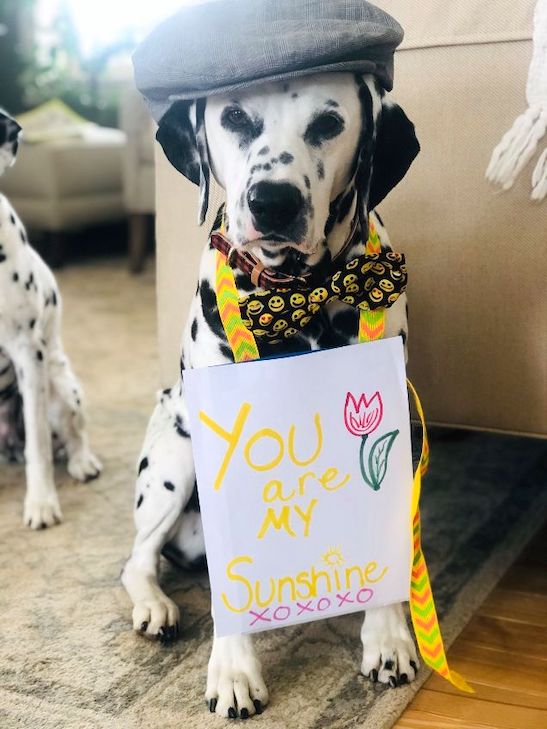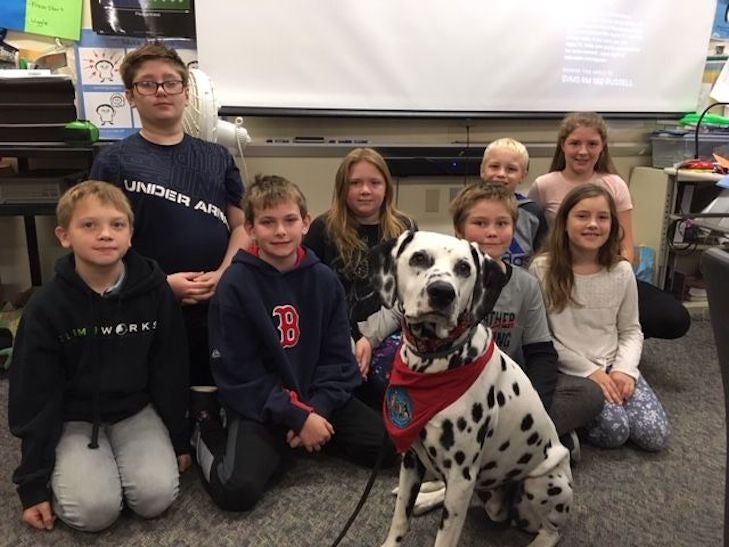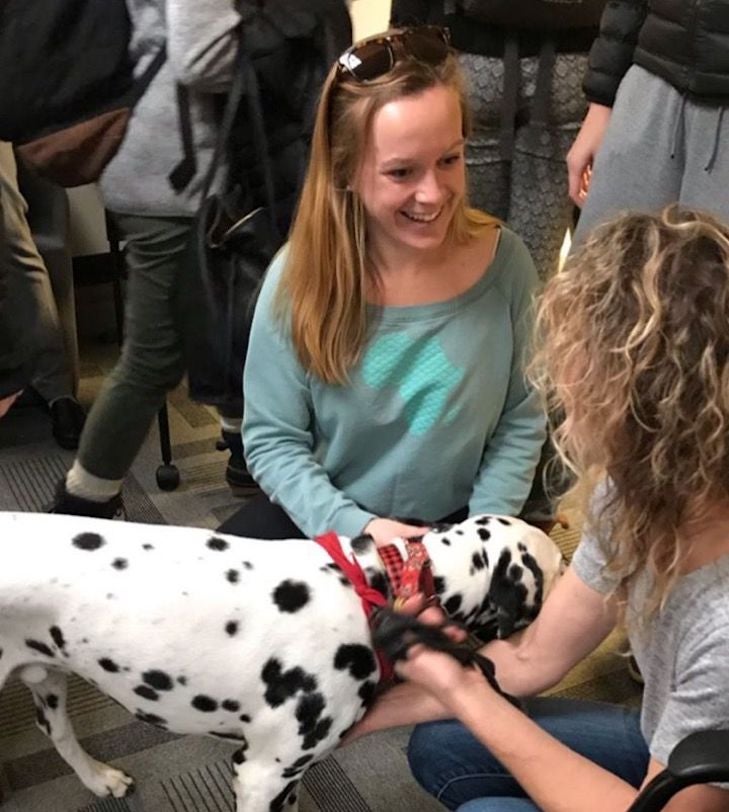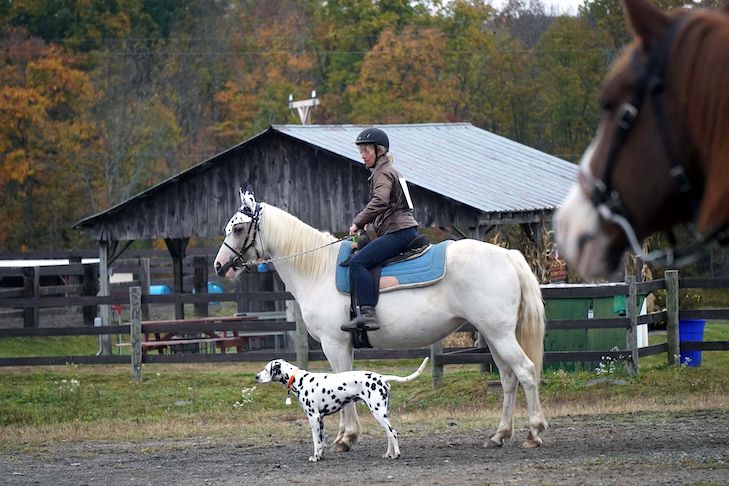
Each year, the AKC Humane Fund pays tribute to five dedicated, hardworking dogs for making significant contributions to an individual or entire community. One award is given in each of the following categories: Uniformed Service K-9, Service, Therapy, Search and Rescue, and Exemplary Companion Dog.
“Dogs are not our whole life, but they make our lives whole.” –author Roger Caras
COVID-19 has affected all of us differently, but few have probably been impacted more than Melissa MacWilliams and Monson of Buxton, Maine (2018 population 8,310).
MacWilliams, co-owner of a landscaping company, was seemingly running a daily marathon with her 9-year-old Dalmatian until early March. And you know what happened then. The winner of the AKC Humane Funds Award For Canine Excellence (ACE) Sponsored by Eukanuba Therapy Dog category had found themselves at different sites almost daily interacting with those in need from a teen shelter to a nursing home.
And it’s hard to imagine how much Monson’s galaxy of friends from teens to the elderly are missing the M&M (Monson and Melissa) team these days. No matter what the age, each visit represented a cascading collapse of emotions and the prospect, in some cases that Monson may be the tonic that shapes a young person’s character going forward.
In Times of Sadness and Joy
This year the M&Ms have managed a few virtual interactions. “I have done videos as much as I can,” says MacWilliams, “since most of the facilities are not allowing us in at this time.”
The 58-pound Monson definitely misses his visits, says MacWilliams. “He knows when his special collar with his Therapy Dogs international tag comes out that we were going to visit his kids and his friends. I made the mistake of moving his collar about a month ago and he got so excited. We have tried to maintain a weekly update on his Facebook and Instagram pages.”
If anyone appreciates Monson’s crisp, colorful, and emotionally rich interaction with others, it’s the refreshingly candid MacWilliams, who battled depression’s demons years ago and learned not to assume the past is the prologue to what’s ahead.
“Monson has always been by my side in times of sadness and joy and seems to just know when I need a paw on the arm to say, ‘Hey, I’m here” or lick on the face to wipe away my tears. I had been searching for a purpose and seeing a psychologist. Together, we were attempting to find and set new goals for me as my life direction changed dramatically from having a terminal autoimmune disease to seeing my immune system rest itself and enjoy a new life.”

The Rewards of a Dalmatian
After losing her first Dal, Harrison, and a good friend, in 2008, MacWilliams began a bucket list hike of the Appalachian Trail from Springer Mountain Georgia. Those losses, plus her autoimmune disorder, prompted her to prove to herself – and everyone else – she could complete the long trek. She came up short, however, saddling her with increased gloominess
What to do?
This prompted a visit to her psychologist, where they discussed dogs. It wasn’t long before she purchased Eva, another Dalmatian, and eventually, 8-week-old Monson, in 2011. MacWilliams credits the clinician for helping channel her life on a positive track over five years. “My doctor continually boosted my confidence and encouraged me to reap the rewards from Monson and give to others,” she smiles. In other words, he’s been her psychological ballast for almost a decade.
Monson, incidentally, was named for the town in Maine which the Appalachian Trail winds through, hence the AKC registered name, Miles to Go Monson.
Starting Therapy Work
A friend, Dawn Eliot-Johnson, of Bryant Pond, Maine, owned a therapy Dal, Ghost, (Monson’s grandfather) and from eying the young Monson’s affinity for those around him she thought he would be well-suited for the same.
Monson began doing unofficial therapy work a couple years later and became fully certified by Therapy Dogs International in March 2017.
“I don’t know where my path would have taken me otherwise. They say the recipients of Monson’s love are the big winners. But seeing the incredible joy he brings to everyone leaves me feeling even more fulfilled,” says MacWilliams.
Sit down, relax, and fasten your seatbelt and check out the enterprising MacWilliams’ weekly therapy-dog visitation schedule in pre- COVID times – and hopefully in the not-too-distant months.

Monson’s Weekly Schedule
Tuesday: Preble Street Teen Center in Portland, Maine, from 6-7:30 p.m. The facility is the hub of multiple services for homeless and runaway youth from 12-21. As they approach the entrance, MacWilliams explains, the youth come running out to greet them. They see residents suffering from Post-Traumatic Stress Disorder, drug/alcohol addiction, borderline personality issues, sexual and emotional abuse, and learning disabilities. “We have earned their trust and respect and do not want to let them down. Thus, it has been gut-wrenching not being able to visit this year.”
Wednesday: Sacopee Valley High School in Hiram, Maine, from 10-11:15 a.m. They arrive a half-hour early for the staff to get its Monson fix. At about 10:30, the M&M team sits in a circle with the students in the library where many will talk about subjects bothering them in their daily lives. “Some ask about me and my life and I share with them what I’ve gone through. Many close bonds have emerged from those frank interactions,” adds MacWilliams.
Thursday: Sacopee Valley Middle School, also in Hiram. They arrive a few minutes before 8 a.m. and often are stopped before entering the building by students wanting to pet Monson. They recognize he is a therapy dog and always ask permission before doing so, adds MacWilliams. “Monson loves being hugged and petted but I make certain students know that all dogs are not like this and they must be mindful of that when approaching others.” They spend about a half-hour in five classrooms where three to four students – some with autism and developmental issues – read to him. “The kids always ask me what type of books do you and Monson like,” she smiles.
Saturday: Logan Place, in Portland, where adults – some suffering from mental illness and addiction – transition from the streets into an assisted-living complex. During the 1-2:30 p.m. visit, Monson handles every interaction with patience and love. “He has been exposed to some things that would scare other dogs, like yelling, exchanges, and intoxicated people but always wants to love,” says his owner-handler.
Sunday: Gorham House, in Gorham, Maine. The pair usually visit the independent/assisted living senior facility from 1-3 p.m. Here, Monson serves up plenty of paws-on therapy to many lonely residents, who “light up” when he approaches. “We visit in the residents’ rooms and thus brought smiles to many family members and grandchildren, too,” adds MacWilliams.
Occasional: University of New England College of Osteopathic Medicine, Biddeford, Maine. This includes four to five, 1½-hour visits a year during exam weeks. At these lovefests, sometimes with as many as 75 students, Monson serves up lots of kisses and in return receives countless belly rubs and smooches. “You can feel the stressed energy when we arrive,” says MacWilliams, “but it all seems to dissipate after we arrive. It’s a much-needed break for everyone.”

Lives Changes by Monson
Dozens of visits have produced their share of lifetime memories.
For instance, there was a student at Sacopee Valley Middle School who would never read aloud because he lacked confidence. After two years, he asked to read to Monson and reached out to MacWilliams to assist him with words. “That left me feeling special that Monson had broken down a barrier like this in a non-judgmental environment. This represented the heart and soul of our work and demonstrated we can make a difference.”
Then there was a homeless 16-year-old Tennessee youth at Preble Street Teen Center who stuck with Monson and MacWilliams like glue throughout their entire visit one day. “He would lay down beside Monson and eventually opened up to Matt (her husband Matthew Dion) and me about horrible events in his life. Months passed and we developed a very special bond with him.
“He would sleep at the teen shelter every night and asked many times if Monson could sleep with him. It broke my heart. Eventually, they found a safe place for him to live.” The MacWilliams remained in contact with him and learned that he and Monson shared the same birthday. The couple visited him monthly until he graduated from high school and moved on to trade school.
During those outings, Monson would go with him to play in the gym and then the four of them would head out on walks in the woods. “It was truly a gift to have him trust us enough to open up and share,” adds MacWilliams.
Yet another poignant memory involved a transgender youth at the Preble Street Teen Center who aged out – older than 21 – and who could no longer enter the building. He knew when we came each week and would wait outside for us just to pet and hug Monson.
“He also asked ‘may I give you a hug. You are a good human being.’ Well, the tears started and I said please take care of yourself we will always be here same night, same time. That hug meant so much.”
And just in case you’re thinking Monson is a one-trick pony, err dog, forget it. The versatile Dal also dabbles in Rally, Obedience, Agility, Barn Hunt, Scent Work, Obedience, Road Dog, as well as Weight Pull. During his COVID layoff this year, he filled in the time by earning an AKC Trick Dog title.

Monson at Home
For Monson, the home setting is like Camelot. MacWilliams and her husband, a huge supporter in her therapy-work and dog-sport endeavors, live on seven acres with neighbors nearby owning horses, donkeys, chickens, and sheep. Directly across the street is a 70-acre recreation area, which they utilize for walking and snowshoeing.
If that’s not enough, at home, the goofy, upbeat Monson has an agility area set-up and a separate playfield where he, Eva, Melissa, and Matt play ball daily. “He is very particular about only playing with his Kong squeaky tennis ball, which he will pick out from a whole box of other toys. If we try to switch it for another, forget it, he will not play,” she laughs.

